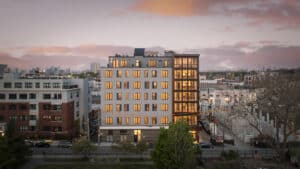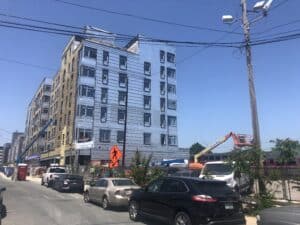
Elected officials have demanded that developers include more for-sale units in new Allston housing developments, but market forces continue to drive price increases. Market-rate condominiums at the brand-new 30 Penn project have sold for $650,000 to $1.75 million. Photo by Armhed Louis Jean | Courtesy of Compass Real Estate
Allston is a microcosm of Boston’s housing affordability dilemma, as developers target virtually every buildable parcel and construct thousands of new apartments and condominiums. And still, prices and rents continue to rise.
Detours block off streets for construction and jersey barriers line sidewalks next to dozens of building sites, attesting to widespread rapid change in the urban landscape. More than 1,200 apartments and condos are under construction in new Allston developments, many rising near the MBTA’s Boston Landing commuter rail station, touting high-end finishes and prices to match.
On a half-acre sliver of land alongside the Massachusetts Turnpike, a new 7-story apartment building called The Indie has begun marketing studios ranging from 329 to 351 square feet for occupancy this fall. The minimum rent: $3,113.
“You’re hearing just ridiculous rents in these new units,” said Anthony D’Isadoro, president of the Allston Civic Association and a second-generation neighborhood resident. “It contributes to [rising] land values, too. Some of these sites are going for ridiculous money based upon the size, but there’s a sense of confidence on the part of the proponents that they can get approvals from the city to get zoning relief to do a hell of a lot more than the site is intended.”
The Indie project was approved under the Boston Planning & Development Agency’s compact living policy, an experiment designed to moderate rents while freeing up existing housing for families. Developers were required to include larger common areas as a trade-off for smaller apartments set at a maximum of 450 feet for studios.
The BPDA has approved 17 projects under the policy since 2018 totaling 2,245 units, most of which are not yet complete. But the agency’s board of directors voted in November to pause the pilot effective May 30, citing the need for more projects to be completed before evaluating its effectiveness.
“Compact living is so different from the needs for families in Allston-Brighton,” said Jo-Ann Barbour, a steering committee member of the Coalition for a Just Allston + Brighton, which took a high-profile role last year pressuring Harvard University to include more affordable units in its Enterprise Research Campus project. “It’s not something that’s family-friendly, and we’re losing families because of the lack of affordability and family-sized units.”

Studio apartments at The Indie development in Allston, approved under Boston’s recently-suspended compact living policy and spanning as little as 329 square feet, are being marketed with rents starting at $3,113. Photo by Steve Adams | Banker & Tradesman Staff
A Housing Laboratory
The development boom is bringing a larger scale and new styles of housing to the neighborhood, once semi-affectionately known as Boston’s “student ghetto” with its high percentage of renters and lively arts and nightclub scene.
The current crop of major developments don’t directly displace existing residents. Nearly 900 apartments and condos could be completed in the next few years at a shopping center anchored by a Stop & Shop Supermarket on Everett Street. And most of the other housing projects replace aging low-density commercial buildings or parking lots.
But housing activists say even the current increase in supply can’t moderate ever-rising rents by itself.
As the BPDA reviews proposed changes to its inclusionary development policy, D’Isadoro said the agency should consider even deep income qualification levels for affordable units.
“We need to provide all types of housing for all types of people. Having a healthy dose at the high end is not a bad thing,” he said. “But what’s happening is we’re not really making a lot of progress on the low end.”
During the first five months of 2023, median condo prices in Allston averaged $652,000, up from $526,000 during the same period in 2022 according to The Warren Group, publisher of Banker & Tradesman.
Co-Living Project Aims to Help
Another experiment in alternative housing models is nearing completion at 525 Lincoln St. in Allston.
The 525 Linc project by Boylston Properties and ARX Urban will be Boston’s second co-living complex, after 7Ink in South End, and will include 278 bedrooms in a 114,000-square-foot building on a three-quarter-acre former parking lot.
Most of the building will be devoted to 58 co-living suites, each with four bedrooms arranged around common living and kitchen areas.
Developers haven’t announced rents yet, but the co-living model includes all-inclusive utilities, furniture and bi-weekly housekeeping. Residents can lease the bedrooms individually, either through their own informal arrangements or through a matchmaking service offered by property manager National Development.
“We think by providing this housing, we can get a lot of these [smaller households] out of the three-deckers, which traditionally has been the family-style housing in Allston,” said Andrew Copelotti, a principal at Boylston Properties. “It frees up the housing stock.”
Elected officials have repeatedly pressed the BPDA in recent years to encourage more home ownership units and large family-sized apartments in the new projects. And some developers have agreed.
Harvard and its private development partner, New York-based Tishman Speyer, agreed to a record 25 percent affordable housing component in the first 263,500-square-foot residential building of the Enterprise Research Campus on Western Avenue.
Jones Street Investment Partners, for its part, set aside 17 percent of the 147 apartments at The Indie as affordable, according to BPDA documents. The Indie developer also went above the requirements of the existing inclusionary development policy by reserving 19 units at 70 percent of area median income or lower, including four artist studios that will rent for $955 per month.
Jones Street Investment Partners declined requests for an interview about the Indie project, and did not respond to emailed questions from Banker & Tradesman.
High-Wage Job Cluster
Harvard and life science developer King Street Properties are building a combined 950,000 square feet of lab buildings on Western Avenue that is expected to employ thousands of researchers and scientists, some of whom will prefer to live close to work.
And the nearly 2 million-square-foot Boston Landing project attracted financial, tech, life science companies and a biotech incubator. Its train station delivers passengers to Back Bay in 10 minutes.

Steve Adams
Matthew Diozzi, a Boston residential broker affiliated with Compass, points to the completion of the Boston Landing station in 2017 as making Allston a more desirable place for professionals who work downtown. But the supply of new luxury condo inventory is only now starting to catch up, with such new projects as the 46-unit 30 Penn complex at 30 Penniman Road which opened in mid-May.
“There have not been many home ownership opportunities coming to market [in Allston] in recent years, and our building has provided a lot of that necessary inventory,” said Diozzi, who was meeting prospective buyers for eight tours last Wednesday.
The building, located a three-minute walk from Boston Landing station, has attracted buyers who work downtown as well as commuters to MetroWest.
30 Penn is 77 percent sold, with prices ranging from a low of $649,000 to a three-bedroom penthouse selling for $1.75 million.
“When you look at [condo] ownership opportunities, a lot of times the rental buildings get built first, then condos come second,” Diozzi said. “The condos come next where you have a built-in buyer pool of residents who live in the area and they want to stay. That’s when more condos get built.”




 |
| 
